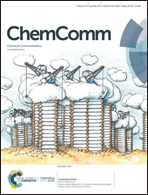sp–sp2 hybrid-conjugated microporous polymer-derived Pd-encapsulated porous carbon materials for lithium–sulfur batteries†
Abstract
Pd-encapsulated porous carbon materials (Pd-PCMs) were prepared from the coupling polymerization of an aryl halide and aryl alkyne under mild conditions. Combining its porous microstructure and encapsulated Pd nanoparticles, Pd-PCMs with high sulfur loading reach a capacity of 920 mA h g−1 after 200 cycles at 0.3C.



 Please wait while we load your content...
Please wait while we load your content...